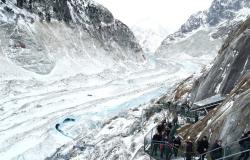You say it November 12 –
La Grande Cariçaie, EFAS, growth of Switzerland and vote on the motorways
Find your readers' mail here.
24 hours/readers
Published today at 7:07 a.m.
Subscribe now and enjoy the audio playback feature.
BotTalk
Great Cariçaie
Concerns the article “This demolition is a bit like a death in the family” (“24 Heures” of November 7).
In Cheyres, under pressure from the Friborg authorities, the Arm family had to dismantle their three fishing cabins, one of which housed a small professional fishing museum. What a waste! What injustice!
In Friborg and Vaud we seem to be ignoring the federal ordinance on marshy sites, which takes precedence over all other inventories. In accordance with its protection objectives (art. 4), experts, commissioned in the 1990s by the Confederation, drew up a list of attacks and objects to be protected in the Grande Cariçaie. Under “Historic-cultural elements”, it is mentioned: “Château de Champ-Pittet, menhirs, fishermen's huts as witnesses to a typical use of the site, notably at Yvonand and Cudrefin”.
We have this document, still current, sent to the cantons by Berne for the implementation of the protection objectives of the federal ordinance. A rule of law must respect these rules. He does not do so, preferring to demand his land and the destruction of the cabins. We must therefore fight to save this unique heritage of its kind (our experts say), in order to entrust it to the community for the history of the traditions of an age-old profession.
La Grande Cariçaie is 3000 hectares of nature. This set of five fishing huts, described as traditional constructions and structures of the habitat of the marshy site, occupies approximately 1200 m2.
Arnold Ottonin, president of the Association of owners of the Fishing Village of Yvonand, Bretigny-sur-Morrens
Migrations
Nowadays, some people complain about the number of foreigners coming to settle in Switzerland, attracted by our well-being.
It is good to remind them that in the 1920s and 1930s many Swiss people had to emigrate to find work! My father was told after his banking apprenticeship that he had to leave his job to make way for the next ones. He went to Paris, where after a few odd jobs, he found a job in a bank where he spent his entire career.
In France he met my mother, a qualified nurse, who also had not found work in Switzerland.
Isn't it logical that nowadays foreigners in the same situation turn to our country to find work?
René Keller, Montreux
Suisse
Our parliamentarians, almost all of whom have economic interests, think that there is only growth to maintain our standard of living. So we build at all costs, no matter how, by cramming thousands of people into the last buildable areas.
These new inhabitants, having nothing in their neighborhoods, head for services and leisure in the cities, to find a little “oxygen” in the woods, by the lakes, in the mountains or abroad. . This new population is causing saturation of all means of transport, particularly trains and automobile traffic.
Through a domino effect, this causes a lack of daycares, schools, caregivers, doctors and workers in all areas. This also requires the expansion of all the facilities providing us with comfort: purification, roads, hospitals, schools, etc.
What future for our young people when we see the situation deteriorating so quickly?
It is becoming urgent to take measures to curb this frenzied population growth.
François Capt, Épalinges
DELETE
Former Federal Councilor Eveline Widmer-Schlumpf, president of Pro Senectute Suisse, spoke out in favor of increasing the retirement age for women, against the granting of a 13e AVS pension and in favor of controversial reforms of the second pillar. She now supports the EFAS project, a modification of the LAMal which, far from reducing costs, risks complicating access to care for the elderly. EWS argues in the media that opponents of EFAS “instrumentalize” seniors.
At Avivo, where I chair the Geneva section, with 10,000 members, we defend the interests of seniors, particularly those on the lowest incomes. Our positions often diverge from those of the president of Pro Senectute, and for the vote on November 24, we believe that this reform risks worsening the precariousness of retirees and degrading the quality of care. Insurance lobbies obviously do not appreciate our committed position.
Faced with uncertainties and the absence of guarantees for the future, Avivo Geneva and Avivo Switzerland are calling to refuse this revision of the LAMal during the vote on November 24. Our seniors deserve real consideration in the decisions that concern them, which is not the case with this reform.
Ueli Leuenberger, president of Avivo Geneva
Highways
Concerns the article “Do traffic jams boost prices at Coop and Migros?” (“24 hours” of November 6).
If traffic jams cost the agri-food industry, among the external costs of automobile traffic, those linked to sanitation costs and health are often forgotten. And if the extension of the A1 motorway is rightly criticized from an environmental, economic or modal angle, less attention is paid to the impact on the health of local residents of this mega motorway project.
Transport is a major source of air pollution which increases the risk of developing lung diseases, heart disease, stroke or cancer. Noise also has a very harmful impact, when it is excessive, for the people who experience it. The disturbances resulting from repetitive passing cars harm concentration, communication but also calm and rest. Two essential elements to be and stay healthy. Long-term exposure to pollution and transport noise in Switzerland is known to contribute to premature mortality.
All this is without taking into account the desire of the bourgeois majority in the federal parliament to wage a battle against noise protection: it is in fact planned to lower the criteria for noise protection for new housing or renovations. This must make us fear the worst for the residents of these mega concrete projects!
Léonore Porchet, national advisor for Les Verts
Did you find an error? Please report it to us.
0 comments






